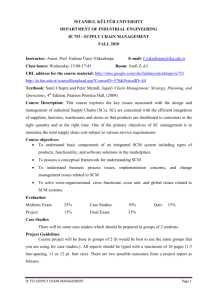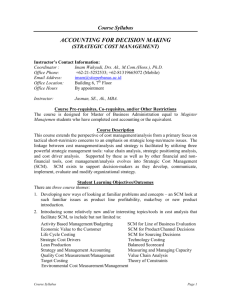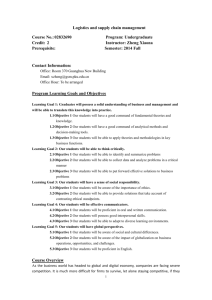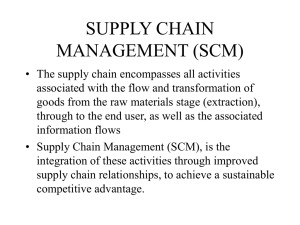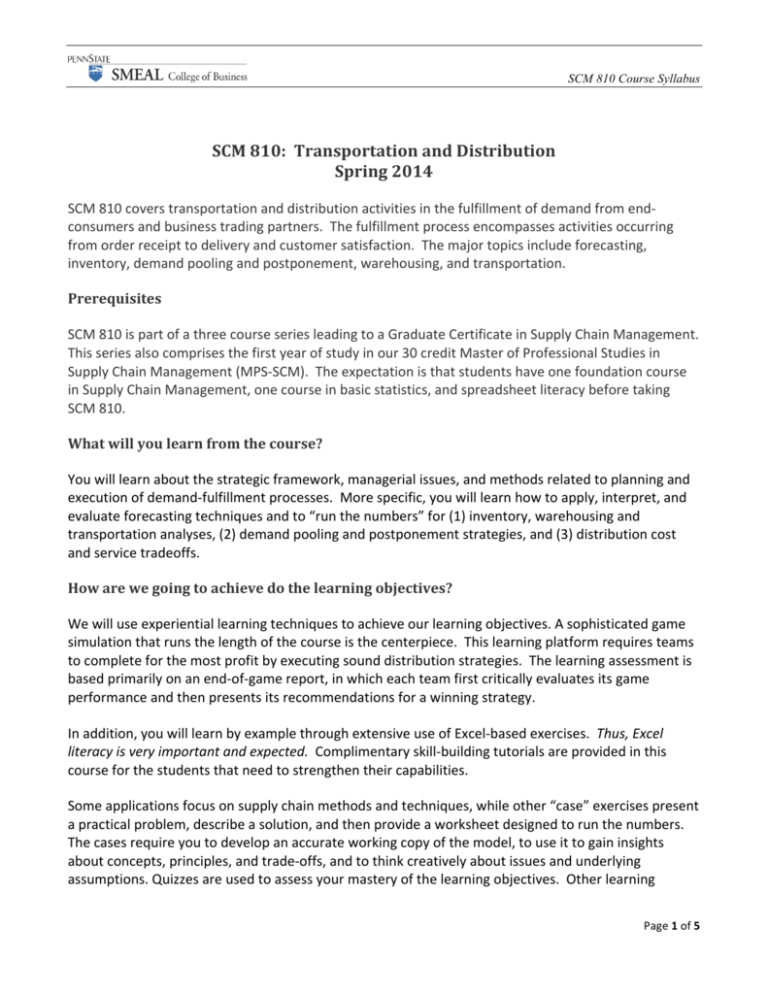
SCM 810 Course Syllabus
SCM 810: Transportation and Distribution Spring 2014 SCM 810 covers transportation and distribution activities in the fulfillment of demand from end-­‐
consumers and business trading partners. The fulfillment process encompasses activities occurring from order receipt to delivery and customer satisfaction. The major topics include forecasting, inventory, demand pooling and postponement, warehousing, and transportation. Prerequisites SCM 810 is part of a three course series leading to a Graduate Certificate in Supply Chain Management. This series also comprises the first year of study in our 30 credit Master of Professional Studies in Supply Chain Management (MPS-­‐SCM). The expectation is that students have one foundation course in Supply Chain Management, one course in basic statistics, and spreadsheet literacy before taking SCM 810. What will you learn from the course? You will learn about the strategic framework, managerial issues, and methods related to planning and execution of demand-­‐fulfillment processes. More specific, you will learn how to apply, interpret, and evaluate forecasting techniques and to “run the numbers” for (1) inventory, warehousing and transportation analyses, (2) demand pooling and postponement strategies, and (3) distribution cost and service tradeoffs. How are we going to achieve do the learning objectives? We will use experiential learning techniques to achieve our learning objectives. A sophisticated game simulation that runs the length of the course is the centerpiece. This learning platform requires teams to complete for the most profit by executing sound distribution strategies. The learning assessment is based primarily on an end-­‐of-­‐game report, in which each team first critically evaluates its game performance and then presents its recommendations for a winning strategy. In addition, you will learn by example through extensive use of Excel-­‐based exercises. Thus, Excel literacy is very important and expected. Complimentary skill-­‐building tutorials are provided in this course for the students that need to strengthen their capabilities. Some applications focus on supply chain methods and techniques, while other “case” exercises present a practical problem, describe a solution, and then provide a worksheet designed to run the numbers. The cases require you to develop an accurate working copy of the model, to use it to gain insights about concepts, principles, and trade-­‐offs, and to think creatively about issues and underlying assumptions. Quizzes are used to assess your mastery of the learning objectives. Other learning Page 1 of 5 SCM 810 Course Syllabus
methods used in the course include participation in on-­‐line discussion forums and practice exercises. Finally, peer reviews by team members will be part of the class participation assessments. What will be expected of you, the student? Assignments and Due Dates. Please check the ANGEL course calendar (Calendar Tab) regularly for assignment due dates. Additionally, please use the “Schedule & Assignments” check sheet located in the “Course Syllabus and Schedule” folder in the “Lessons” tab in ANGEL for planning ahead and monitoring course progress. Team Participation. You will be assigned to a team to play the Distribution Strategy Game. This assignment requires active participation in strategy development and its execution in weekly rounds of play. Most important, teams must develop two reports at the end of the semester. The expectation is that you will be actively engaged in developing the reports. Class Participation. Students must actively participate throughout the semester. You should maintain regular contact with groups and try to log on to ANGEL and discussion forums daily to keep up with the latest postings. The expectation is that your contributions will be professional, timely, substantive, positive, and energetic. In other words, you will be a good team player and class contributor. If you face unexpected personal or professional difficulties that hinder your performance, please send timely notice to the instructor. You are expected to maintain the highest level of academic integrity, which among other things, means that you may neither give nor receive any help on quizzes and exams. Likewise, although you may discuss case elements and methods with other individuals in discussion forums or elsewhere, individual written assignments must represent your work and must not be byproducts or copies of a joint work effort. What can you expect of me, the instructor? •
•
•
•
I will be on-­‐line frequently during the week to answer questions or respond to comments that you may have. I will provide guidance for you on written assignments either individually or through discussion forums, where other students can visit and get answers to the same question(s). I will provide specific learning objectives for each course module. I will grade assignments in a timely manner. Grade Valuations: Below are the relative grade valuations we will use in SCM 810. Letter Grade
Percentage
GPA
A
93-100
4.00
A90-92
3.67
B+
87-89
3.33
B
83-86
3.00
B80-82
2.67
C+
77-79
2.33
C
70-76
2.00
D
60-69
1.00
F
59
zero
Page 2 of 5 SCM 810 Course Syllabus
Assignment Weights Module
Topic
Quizzes
Comment
0
Orientation
1
Distribution Strategy Game
5
Multiple takes, highest score recorded
2
Demand Forecasting
10
One take
3
Inventory Systems
10
One take
5
Demand Pooling
10
One take
6
Warehousing & Transportation
10
One take
Quiz Total
45
Class Participation
15
Total individual points
60
DSG reports
20
Final Exam
20
Total team points
40
Total points
100
Discussion forums and team peer reviews
One grade for both DSG reports
Academic Integrity: According to the Penn State Principles and University Code of Conduct: Academic integrity is a basic guiding principle for all academic activity at Penn State University, allowing the pursuit of scholarly activity in an open, honest, and responsible manner. According to the University’s Code of Conduct, you must neither engage in nor tolerate academic dishonesty. This includes, but is not limited to cheating, plagiarism, fabrication of information or citations, facilitating acts of academic dishonesty by others, unauthorized possession of examinations, submitting work of another person, or work previously used in another course without informing the instructor, or tampering with the academic work of other students. Any violation of academic integrity will be investigated and, where warranted, corrective academic and/or disciplinary action will be taken. For every incident where a penalty is assessed, an Academic Integrity Incident Report form must be filed. The form can be found on the Smeal College Intranet at this URL: http://ugstudents.smeal.psu.edu/honor/Undergraduate%20Incident%20Report%20Form .The report must be signed and dated by both the instructor and the student, and then submitted to the appropriate deans. In addition, the Smeal College has adopted the following Honor Code: We, the Smeal College of Business Community, aspire to the highest ethical standards and will hold each other accountable to them. We will not engage in any action that is improper or that creates the appearance of impropriety in our academic lives, and we intend to hold to this standard in our future careers. Page 3 of 5 SCM 810 Course Syllabus
Plagiarism/Copying: All work you submit for grading or academic credit is designed to reflect your knowledge and skill related to the course subject matter. Therefore, unless otherwise indicated, all work submitted is to be done on an individual basis. Plagiarism is claiming work as your own that you have copied from another person, whether that other person knows about it or not. This includes copying from web sites without proper source citation and using homework or papers prepared by current or past students whether working as an individual or working in a group / team. Penn State Accessibility: Penn State welcomes students with disabilities into the University's educational programs. If you have a disability-­‐related need for reasonable academic adjustments in this course, contact the Office for Disability Services (ODS) at 814-­‐863-­‐1807 (V/TTY). For further information regarding ODS, please visit the Office for Disability Services Web site at http://equity.psu.edu/ods/. In order to receive consideration for course accommodations, you must contact ODS and provide documentation (see the documentation guidelines at http://equity.psu.edu/ods/guidelines/documentation-­‐
guidelines). If the documentation supports the need for academic adjustments, ODS will provide a letter identifying appropriate academic adjustments. Please share this letter and discuss the adjustments with your instructor as early in the course as possible. You must contact ODS and request academic adjustment letters at the beginning of each semester. Affirmative Action & Sexual Harassment: The Pennsylvania State University is committed to a policy that all persons shall have equal access to programs, facilities, admission, and employment without regard to personal characteristics related to ability, performance, or qualifications as determined by University policy or by commonwealth or federal authorities. Penn State does not discriminate against any person because of age, ancestry, color, disability or handicap, national origin, race, religious creed, sex, sexual orientation, or veteran status. Direct all inquiries to the Affirmative Action Office, 328 Boucke Building. If you need technical assistance at any point during the course, please contact the World Campus Help Desk. Disclaimer: Please note that the specifics of this Course Syllabus can be changed at any time, and you will be responsible for abiding by any such changes. Changes will be posted to the announcements area on the course home page. Copyright © 2013 The Pennsylvania State University Contact Penn State ANGEL Support Page 4 of 5 SCM 810 Course Syllabus
©2012 ANGEL Learning, Inc. All rights reserved. Page 5 of 5


